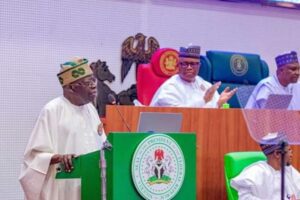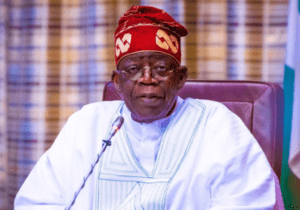Corruption undermining Nigeria’s investment in education — Buhari
…Presents 2022 Public service integrity award to SP Amah for rejecting $200,000 bribe
…Education impossible with anti-corruption crusade- Boss Mustapha
…As ICPC intensifies scrutiny on MDA’s to flush out fake appointments, frivolous cost
President Muhammadu Buhari on Tuesday decried the level of corruption in the education system, stating that it has been undermining investment in the university system.
This is as Buhari accused the Academic Staff Union of Universities (ASUU) of prolonging public varsities strikes on flimsy excuses.
Buhari spoke at the Fourth National Summit on Diminishing Corruption in the Public Sector, organized by the Independent Corrupt Practices Coming (ICPC) in collaboration with the Office of the Secretary of the Government of the Federal (OSGF) and the Joint Admission Matriculation Board (JAMB) with theme, ‘Corruption and the Education Sector,’ where he disclosed that the incessant strikes by unions in public universities have further worsen corruption.
According to him, “Incessant strikes especially by unions in the tertiary education often imply that government is grossly underfunding education, but I must say that corruption in the education system from basic level to the tertiary level has been undermining our investment in the sector and those who go on prolonged strikes on flimsy reasons are no less complicit.”
Buhari noted that due to declining resources, government cannot bear the cost of funding education alone.
“I task our academics to attract endowments, research and other grants to universities, polytechnics and colleges of education similar to what obtains in other countries,” he said.
According to him, government and stakeholders in the educational sector are concerned about the manifestation of various forms of corruption in the education sector.
“I am aware that students in our universities for example, use different terminologies to describe different forms of corruption they experience on our campuses.
“There is sorting or cash for marks/grades, sex for marks, sex for grade alterations, examination malpractice, and so on.
“Sexual harassment has assumed an alarming proportion. Other forms of corruption include pay-roll padding or ghost workers, lecturers taking up full time appointments in more than one academic institution, including private institutions, lecturers writing seminar papers, projects and dissertations for students for a fee, and admission racketeering, to mention only the most glaring corrupt practices.
“I am happy to note that ICPC is investigating and prosecuting sexual harassment as abuse of power in our educational institutions. I approve and encourage them to continue to do so.”
He said government will continue to fund education within realistically available revenue and charged stakeholders, including the media to equally advocate for transparency in the amount generated as internally generated revenue by educational institutions and how such funds are expended.
Also speaking the Secretary to the Government of the Federation Boss Mustapha, said corruption was eroding the practical purpose of education at all levels in the Nation, while education ironically plays an enabling role for corruption.
“Corruption has become endemic in the education sector as students, teachers and lecturers have become permeable to corruption.
“The purpose of education cannot be achieved without anti-corruption,” he said.
He added that corruption required a collective efforts and that all citizens must join hands to fight the monster.
Earlier in his remarks, the ICPC Chairman, Prof. Bolaji Owasanye said the commission had constituted a special team on investigation and prosecution of sexual harassment in secondary and tertiary institutions.
Owasanye said as part of the efforts to sanitise the public service and upscale integrity, the Commission has been collaborating with the Office of the Head of the Civil Service of the Federation (OHCSF) to flush out fake appointments and screen candidates for appointment to position of permanent secretaries amongst other initiatives.
He added that the ICPC had intensified its scrutiny of personnel and capital cost of MDAs leading to proactive restraining of surpluses or duplications in the budget.
“The findings thus far indicate that many prospective appointees are implicated for financial impropriety, corrupt practice, failure of code of conduct standards and substance abuse. The commitment of the Head of Service to clean up the stable by effective pre appointment screening is commendable and ICPC will continue to play its part.
“We are vigorously exploiting technology solutions to some of the systemiccorruption we have unearthed.
“In collaboration with civil society we are in the process of introducing a model policy on sexual harassment for academic institutions to adopt we have also secured some major convictions including of a professor.
“ICPC has escalated its prevention mandate in the face of costly, time consuming and unpredictable outcomes of investigation and prosecution. In this regard we are strengthening the Anti-corruption and Transparency Monitoring Unit (ACTU) in MDA’s,” he noted.
Meanwhile, during his Keynote presentation, the former Independent Electoral Commission(INEC) Chairman, Prof Attahiru Jega called for a comprehensive strategy to addressing corruption in Nigeria.
He advocated for an effective use and deployment of transparency promoting tool in public establishments including education institutions.
Jega added that federal government should boost the legal framework of its whistleblowing policy and existing anti-corruption policies.
Major highlight of the event is the presentation of the 2022 Public Service Integrity Award to SP Daniel Amah by Buhari for rejecting $200,000 bribe.




